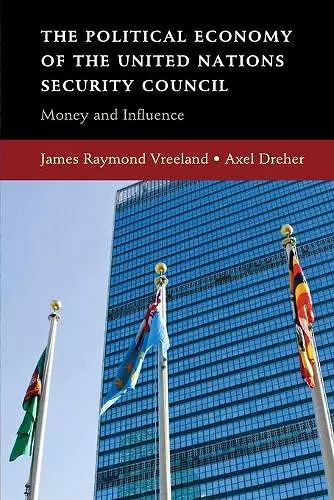The Political Economy of the United Nations Security Council
Money and Influence
Axel Dreher author James Raymond Vreeland author
Format:Paperback
Publisher:Cambridge University Press
Published:29th May '14
Currently unavailable, and unfortunately no date known when it will be back
This paperback is available in another edition too:
- Hardback£78.00(9780521518413)

This book investigates the ways governments trade money for favors at the United Nations Security Council.
Powerful countries often extend financial favors to strategically important countries. This book demonstrates that developing countries elected to the United Nations Security Council receive increased amounts of direct foreign aid as well as loans from international organizations, and in return must deliver their political support or face the consequences.Trades of money for political influence persist at every level of government. Not surprisingly, governments themselves trade money for political support on the international stage. Strange, however, is the tale of this book. For, in this study, legitimacy stands as the central political commodity at stake. The book investigates the ways governments trade money for favors at the United Nations Security Council - the body endowed with the international legal authority to legitimize the use of armed force to maintain or restore peace. With a wealth of quantitative data, the book shows that powerful countries, such as the United States, Japan, and Germany, extend financial favors to the elected members of the Security Council through direct foreign aid and through international organizations, such as the International Monetary Fund and the World Bank. In return, developing countries serving on the Security Council must deliver their political support … or face the consequences.
'Vreeland and Dreher provocatively but convincingly demonstrate that United Nations Security Council votes can and are bought through increased foreign aid. Great powers want the United Nations to approve and legitimate their actions; minor countries care more about development or regime stability than the intricacies of high-stakes diplomacy. In often subtle, implicit, and difficult-to-trace ways, UNSC votes are traded for aid, and vice versa, undermining the efficacy of aid in general. This is a fascinating 'whodunit' with at least some of the suspense of a good murder mystery. Vreeland and Dreher pull back the curtain on an unseemly but perhaps necessary side of international diplomacy.' David A. Lake, Jerri-Ann and Gary E. Jacobs Professor of Social Sciences and Distinguished Professor of Political Science, University of California, San Diego
'This book offers a novel view of the UN. It shows how power matters in world politics and how states can use international organizations to advance their own foreign policy goals. It advances a clear and precise story about national influence in global governance. Countries trade favors in the forum of the UN to gain legitimacy for their policies. The book ends by addressing a number of creative proposals for reform of the UN. It is an important and careful study of influence in world politics.' Helen Milner, Princeton University
'Scholars of foreign policy, take note! In this provocative and exceptionally well-researched book, Vreeland and Dreher make a convincing case that governments of powerful countries routinely allocate their foreign aid budgets in a manner akin to horse trading: poor countries that vote in line with their richer counterparts in the UN Security Council are subsequently rewarded with greater aid from the World Bank, the IMF, and directly from the United States and other rich countries. The book is exemplary in bridging the politics of international security, the economics of development, and the dark underbelly of international organizations.' David A. Singer, Massachusetts Institute of Technology
'Vreeland and Dreher have written a remarkable book. That the United States trades resources for votes at the United Nations Security Council (UNSC) is at once hardly surprising and shocking in its depth and significance … This is an epic contribution to our knowledge of the inner workings of the UNSC; it will undoubtedly become an essential read in the political economy of international organizations.' B. Peter Rosendorff, New York University
'An impeccably executed study that neatly combines sophisticated statistical analysis with probing interviews of the major players. Vreeland and Dreher's book will immediately be regarded as the authoritative source on the subject.' Ronald Rogowski, University of California, Los Angeles
'This book is one of those instances where the focus of the study is not on which aspect of power is more important but on how one mechanism of power is used to generate more power in a different area. Vreeland and Dreher's examination is thorough, thought provoking, and rigorous. It will appeal to those interested in foreign aid, international organizations, the UN Security Council and international politics more generally.' Clayton J. Cleveland, Academic Council on the United Nations Systems
- Short-listed for William H. Riker Book Award, Political Economy Section, American Political Science Association 2015
ISBN: 9780521740067
Dimensions: 229mm x 152mm x 18mm
Weight: 460g
312 pages